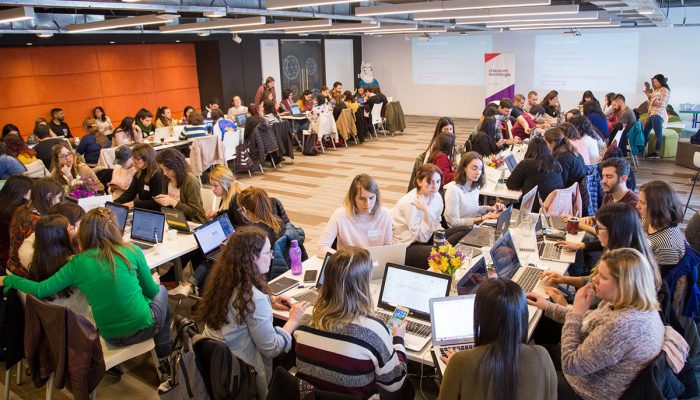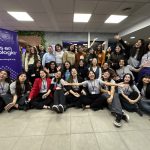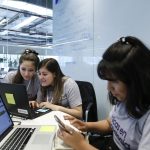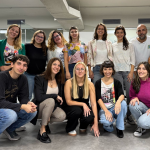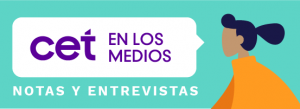#CompilatónCET: Collaborative Work to Reduce the Gender Gap
Chicas en Tecnología and Mulesoft called for the creation of an online repository with free and open access information on STEM (Science, Technology, Engineering, Mathematics) and gender issues.
Cultural and systemic changes are processes that are built through the collective work of multiple actors involved with a mission. Chicas en Tecnología knows that individual effort is not enough to create social impact and makes this evident in each of the events it organizes, to which several sectors of society are invited to work, reflect and build a context of equality in which innovation and development are possible. With this idea as a guide and in alliance with Mulesoft, the first #CompilatónCET was a key event in terms of collective work, as the general public was invited to identify, classify and systematize sources of information on the gender gap in science and technology with the purpose of creating an online, dynamic and continuously growing repository of information. Having these updated and accessible data is essential to be able to measure the problem and implement public policies and changes in several sectors of society that contribute to reducing this gap.
The Mulesoft offices in the city of Buenos Aires hosted this multidisciplinary meeting: the Compilatón was attended by a heterogeneous audience that included journalists, researchers, teachers, programmers, designers, university students, CET ambassadors and representatives of organizations and institutions such as Universidad Nacional de Hurlingham [National University of Hurlingham], Wikimedia and Las de Sistemas. To start creating the repository, groups with several profiles were created. These groups were identified with the names of women leaders in science and technology, and in addition to working with the information sources, they were able to exchange experiences, create new contacts, learn in depth about the impact of the gender gap in STEM (Science, Technology, Engineering, Mathematics) careers and become involved with a community actively participating to create changes with social impact.
Searching for Data
First, the context: “What is the gender gap in technology? Thanks to data we collected ourselves, we know that only 16% of the enrollments in public and private universities in the country in careers related to programming and technology are women. And in companies and public spaces where software is developed, that number may be even smaller. Women are left aside from those spaces where the technology that we all use to communicate, move and relate to each other is created and built,” said Consuelo López, volunteer advisor of Chicas en Tecnología Programs, as soon as the Compilatón began. The organization targets its programs to teen girls across the country so that they know that developing in science or technology is a valid option for them. However, the challenge does not end there. It is necessary to work with society as a whole to create a comprehensive proposal, in which girls can become female leaders. “This led us to the need to create data, reports, to ally ourselves with other organizations to be able to have a constructive discuss on the subject, to speak knowledgeably and to understand the causes of the gender gap in science and technology in order to propose concrete solutions,” concluded Consuelo.
The impetus behind this meeting came from Alejandra Gutiérrez, sociologist and teacher specialized in Comprehensive Sexual Education and Education and New Technologies, volunteer of Chicas en Tecnología. Alejandra joined the organization in 2018 as a facilitator of #ClubesCET, a program that accompanies girls to become, in addition to users, creators of technology. She also participated in the research that Chicas en Tecnología carried out together with INTAL BID, “Un potencial con barreras” [A potential with barriers], for which she interviewed graduates of STEM careers, conducted focus groups, and then studied and processed the information. “The Compilatón arises from the need to organize information for those who need it or are interested in the subject, but also so that those who make decisions or design social policies can find information that allows them to change an unequal situation into an equal one,” explained Alejandra.
After that, back to work. The #CompilatónCET took place in three stages: one of exploration, one of preservation of sources, and one of systematization through the uploading of information. The participants freely organized the work within each group: they divided the sources to be classified, discussed which labels corresponded to each one and delved deeper into some of the materials.
Anna Torres Adell, Executive Director of Wikimedia Argentina, was part of one of the groups: “It is a privilege to participate in this activity, which is very important for the work we develop at Wikimedia Argentina, the organization behind projects such as Wikipedia. Collaborative knowledge building and having primary and secondary sources is critical to continue improving the articles that currently exist about women in STEM (acronym for Science, Technology, Engineering and Mathematics) within the encyclopedia.”
Alejo Zito, 29 years old, studied Film and worked in the audiovisual world, but over the years, he decided to study Systems Engineering and is currently professionally devoted to that discipline: “I noticed a big difference between working in film and television and working in engineering and systems. Those differences made me want to reach out to organizations like Chicas en Tecnología. I am currently working in a large company and in the team where I am we are all men. I find the Compilatón very interesting because, even in my work, we are always talking about diversity and how many women are in the engineering teams. Sometimes, there are inputs with which I do not agree at all, and I like having the knowledge to be able to talk to my peers.” Esteban Wasinger also studied Systems Engineering but, as a Mulesoft volunteer, he had already worked alongside CET at the 2017 PUMM, which was held at the company’s offices: “I really like Chicas’ mission of being able to reduce the gender gap in the world of technology, which is where I am most involved. I believe there is no difference in people’s ability just because of their sex, and if such a difference does exist, it is because there is a preconception. In Mulesoft I have leaders, I would like to be like certain people, and they are women. I really think I would never be as good as those women so that is a preconception that has no basis whatsoever.”
Sociology was also one of the disciplines present at the #CompilatónCET. Ana Rapoport has been working at the National Institute of Technological Education [Instituto Nacional de Educación Tecnológica, INET] for 10 years and currently coordinates the Gender Equity Commission there: “We have been working for a long time on educational statistics and studying gender gaps in technical education. That is why having information in an orderly and neat way with official data is a core issue to me. I thought it was important to come and collaborate with this idea of gathering data. Every public policy needs orderly, official and quality data to be able to plan.” The sociologist shared her experience regarding the work modality: “I like that these spaces are being created. I think this is a new way of making public policies in a more transversal, dynamic way, with people who do not have to be experts or chosen from core places. I think it is a very good idea that we can all build a policy based on something as basic as information, which is also public. My team was varied, and I think that is also refreshing and mobilizing for everyone. And I think this is a finding, as it could provide key information to create some public policy.”
The result: the first breakthroughs. The collective achievements of the first #CompilatónCET were shared at the event with all the people who voluntarily contributed their time, experiences, concerns and convictions in an afternoon of collaborative work.
The teams reviewed, preserved, classified and systematized 270 sources in total and the most repeated tags to classify them were: Inequality, Work, Gender Stereotypes/Prejudices. Of the information collected, 24.4% was obtained from reports, while 20.2% was obtained from electronic journals.
Open and Accessible Data
The participation of the whole entrepreneurial technological ecosystem, volunteers, organizations, educational institutions, companies and the general public made it possible for the #CompilatónCET to materialize the first chapter of this collective work. “The final product of the #Compilatón is a dynamic reservoir that does not run out today. Once we process the data, we will leave it open so that people can refer to it and continue adding information and sources to this large collective database,” had explained Alejandra Gutiérrez at the event. Therefore, in a second stage, the Chicas en Tecnología team processed the data, which are now online and open to the public: http://bit.ly/ReservorioSTEAM. The objective is that the repository continues to be enriched with the contribution of people interested in reducing the gender gap in science and technology and contributing to the development of a fairer, more equitable society with greater opportunities for those who are part of it.

